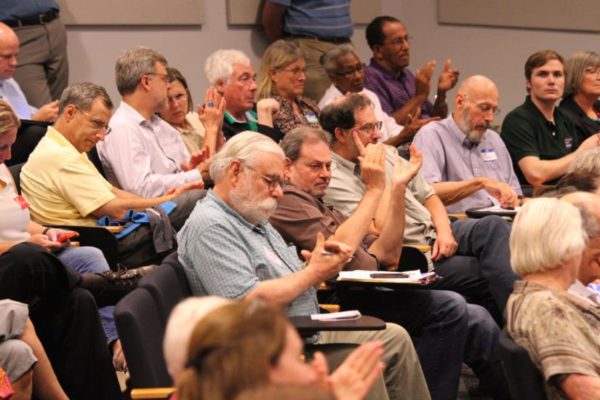
Leaders of a local civic organization admit their membership does not reflect the diversity of Arlington County, but they’re looking to change that.
One of Arlington’s largest community organizations, the Arlington County Civic Federation (CivFed) gives representatives from 85 local groups — including neighborhood civic associations and local advocacy organizations — a non-partisan forum to discuss community topics and provide input on county government and Arlington Public Schools activity.
Generally speaking, however, many delegates are older residents who own homes in North Arlington, and historically, the group has had lower participation from minority groups, younger residents and renters, says CivFed President Allan Gajadhar.
This month the group signaled its commitment to better represent the county by adopting a Diversity, Equity Belonging, and Inclusion resolution. It comes amid ongoing efforts at APS and the county to center racial equity and advance the interests of underserved communities.
In implementing the resolution, Gajadhar says CivFed will focus internally on membership and externally on outreach.
“The representation in the CivFed isn’t fully representative of racial and ethnic and socioeconomic diversity of Arlington,” he said. “There’s definitely a lot more work to be done in the delegate base. That’s not just something that’s going to happen over night. The first thing was to declare our intention to do so — now we are slowly taking steps to evaluate [diversity].”
CivFed, which is nearly 100 years old, aims to bring together and amplify the voices of neighborhood civic associations and organizations such as the local branch of the League of Women Voters. More than 300 delegates vote on resolutions for things on which they want to see the County Board and School Board take action.
CivFed has never formally tallied the demographic diversity of its membership, but it’s not a stretch to say a fair number of delegates are older, wealthier retirees, Gajadhar said.
“It’s been mentioned more than once that the delegate population could be more diverse,” Gajadhar said. “We do have a fair amount of representation from the communities you’d expect.”
CivFed is examining how it can include more young people, people from different racial and ethnic backgrounds, women and renters in its ranks. It is also looking to diversify who holds leadership positions and how information gets communicated. In addition, the resolution made commitments to giving members multicultural competency training, collecting data on community participation, and holding events that engage diverse communities.
Gajadhar, now in his second term, says diversity and equity have been themes during his presidency. He oversaw the launch of a diversity committee, which put forward the resolution.
After the resolution passed with a 94.4% approval rate earlier this month, CivFed surveyed its members to see how they evaluate the diversity of their groups.
The survey is important, Gajadhar says, because CivFed is only as representative as its constituent organizations and realizing the aims of the resolution depends on whether the member groups are equally committed to the stated goals.
“A lot of people don’t necessarily think of the issues that are identified in the resolution as issues,” he said. “We have to be sensitive to who our membership is. We can’t come in with a very strong, forceful mandate or anything like that… We have to go about it carefully — otherwise it’ll be counterproductive.”
One softer approach CivFed took was to nominate more diverse candidates to leadership positions. The effort bore fruit in June, he says, when more young people and women were elected to top posts, including Nicole Merlene, a former Democratic candidate for state Senate, and Alistair Watson, secretary for the Aurora Highlands Civic Association.
As for external efforts to target underrepresented communities, CivFed aims to step up its communications by beefing up its social media presence and possibly posting fliers in apartment buildings, he said.
Getting more people involved would bolster its current efforts to examine county policies and see how they can be reformed to improve equity. Focal points include election reform — allowing ranked-choice voting and potentially changing the structure of the County Board — as well as the efficacy of county engagement processes and what it suggests is an inequitable distribution of Arlington’s tree canopy.
“Our overall mission is to work toward an Arlington that works for everyone,” Gajadhar said. “That is very much in line with improving diversity within CivFed and giving voice to people outside of traditional power and interest groups.”

